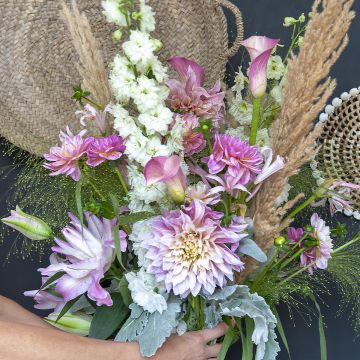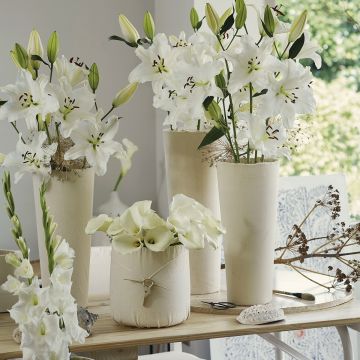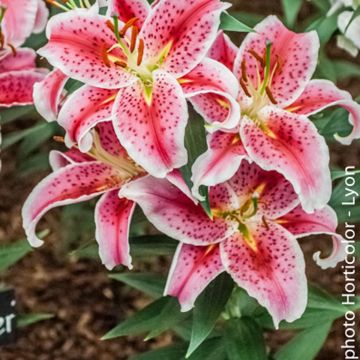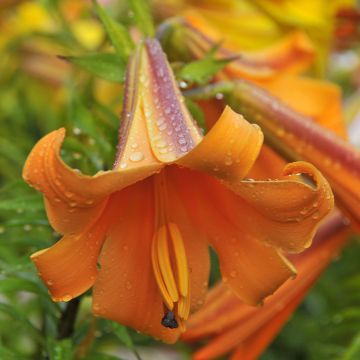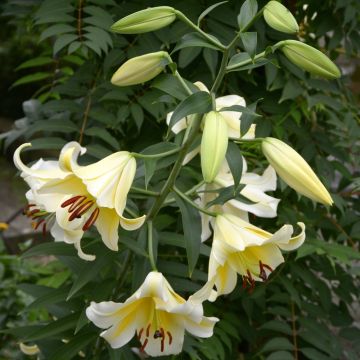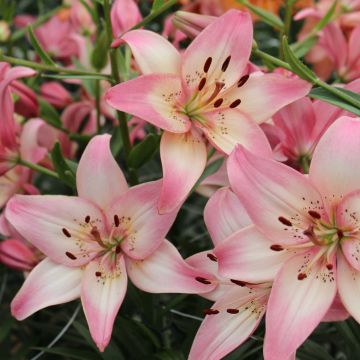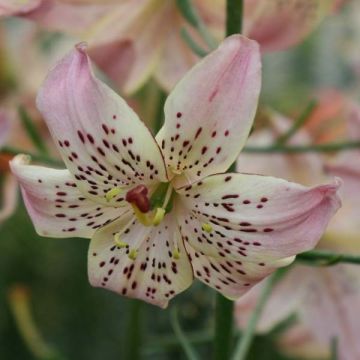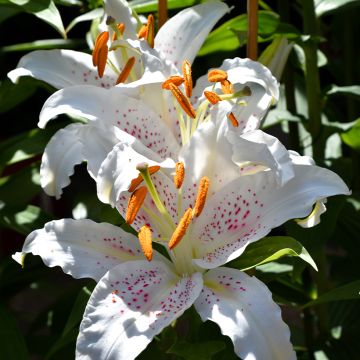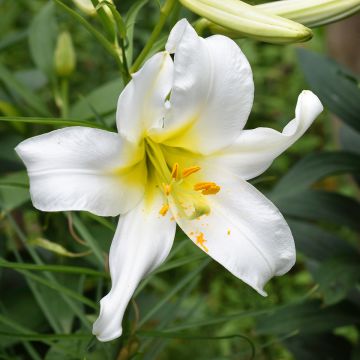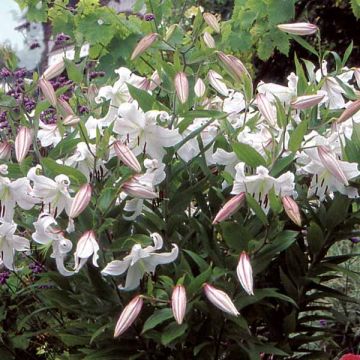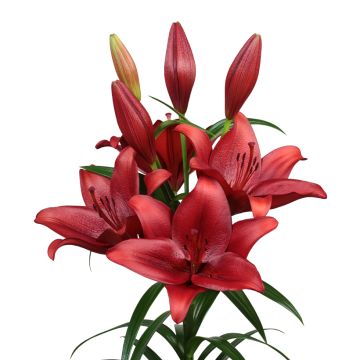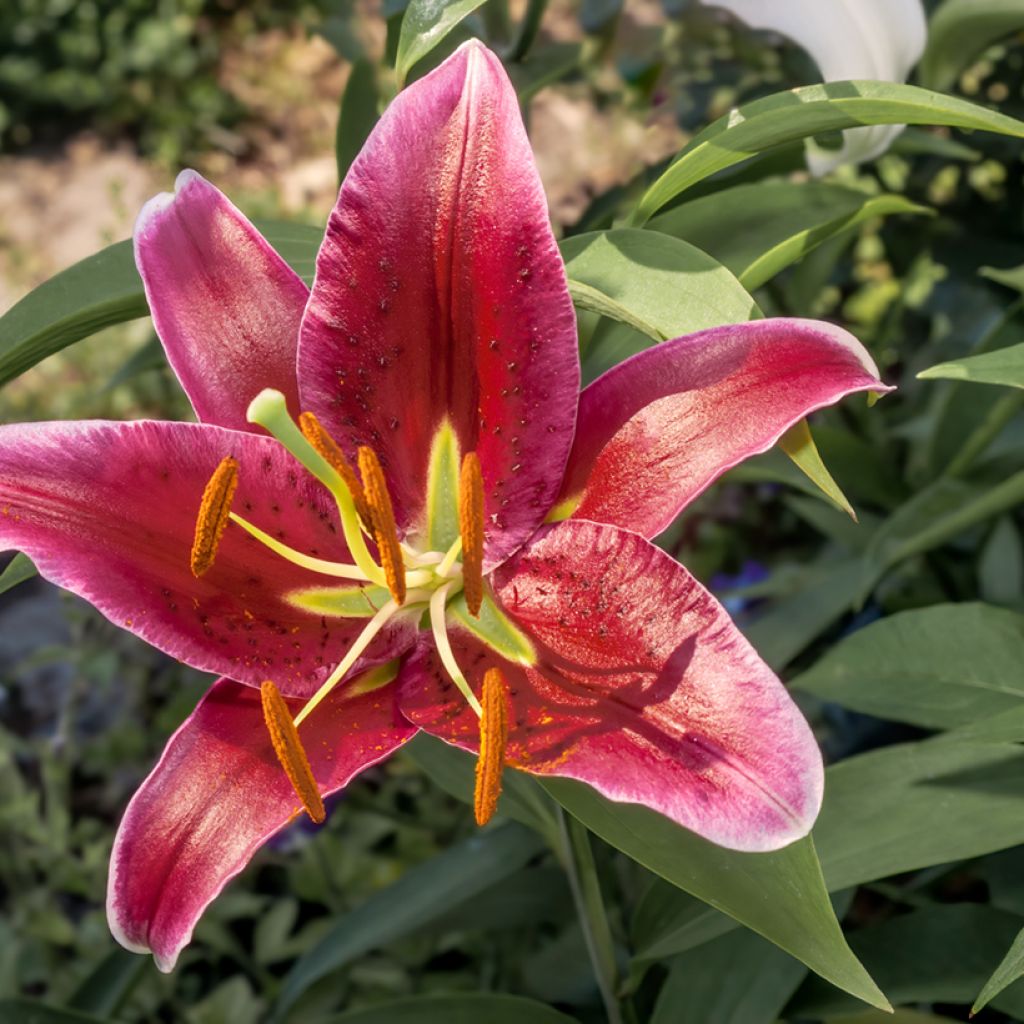

Lilium Bacardi - Lily
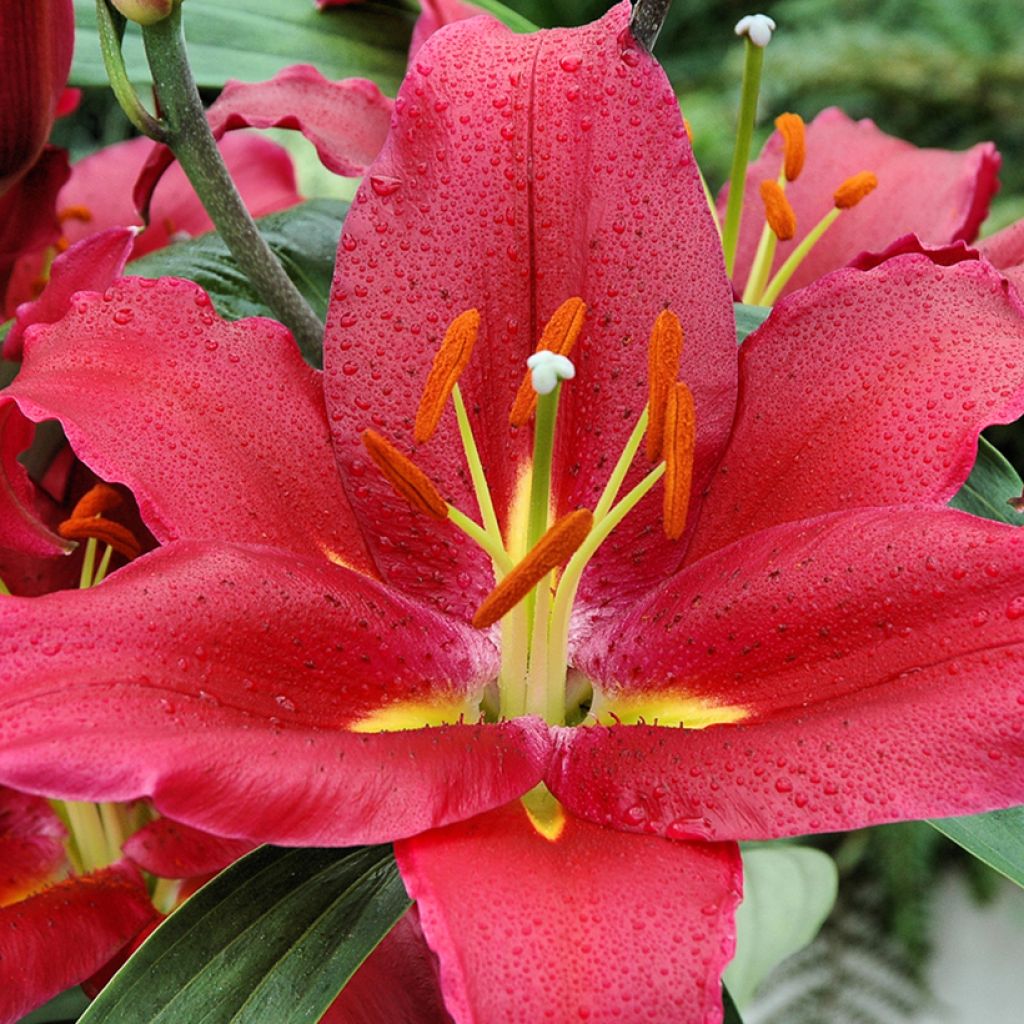

Lilium Bacardi - Lily
Lilium Bacardi - Lily
Lilium Bacardi
Oriental Lily
Special offer!
Receive a €20 voucher for any order over €90 (excluding delivery costs, credit notes, and plastic-free options)!
1- Add your favorite plants to your cart.
2- Once you have reached €90, confirm your order (you can even choose the delivery date!).
3- As soon as your order is shipped, you will receive an email containing your voucher code, valid for 3 months (90 days).
Your voucher is unique and can only be used once, for any order with a minimum value of €20, excluding delivery costs.
Can be combined with other current offers, non-divisible and non-refundable.
Why not try an alternative variety in stock?
View all →This plant carries a 6 months recovery warranty
More information
We guarantee the quality of our plants for a full growing cycle, and will replace at our expense any plant that fails to recover under normal climatic and planting conditions.
Would this plant suit my garden?
Set up your Plantfit profile →
Description
The 'Bacardi' lily belongs to the oriental lily group. It blooms from late July or early August, with wide-open flowers with wavy and curving petals, from large coloured buds, erect like candlesticks. They a dazzling cherry red colour, with a satin-like sheen, and a bright star-shaped centre tinted with yellow and chartreuse. This robust oriental lily is also very fragrant and faithfully blooms in well-drained soil without limestone in a flower bed, in a pot, or even in a large rockery.
The genus Lillium belongs to the lily family, its representatives are bulb whose deciduous vegetation disappears in winter. In spring, leafy stems emerge from the ground and form a narrow and vertical clump. 'Bacardi' is a horticultural hybrid obtained by cross-breeding various species native to the Far East. This plant reaches approximately 1m to 1.20m high when in bloom, and the clump spreads indefinitely over time, with the bulbs producing bulblets through vegetative multiplication. In August, umbels of flowers appear, facing outwards and well-displayed. They are trumpet-shaped and very wide, measuring up to 25cm in diameter, and pleasantly fragrant. These imposing corollas are cherry red or maraschino red with a satin-like sheen and a yellow/chartreuse star-shaped centre. The stamens bear orange to cinnamon-coloured pollen when ripe, completing the harmony of colours. The sturdy stems are covered with alternate, dark green, shiny, lanceolate leaves.
Oriental lilies are slightly more difficult to grow successfully than Asian lilies if the conditions are not met. They require well-drained soil, rich in humus. Any soil that retains moisture in winter is harmful to the bulbs. They do not like limestone soils, and the colours are more intense in acidic soil. Exposure to partial shade, particularly in the afternoon, helps prolong the duration and preserve the brightness of the flowers. For a harmonious flower bed, associate Lilium 'Bacardi' with lilies in shades of pink or purple, gladioli, or daylilies. Incorporating grasses and perennial plants around the lily is good for shading the soil and stabilising the stems against wind and rain. It can also be grown on the edge of a grove, surrounded by small bushes such as rhododendrons or azaleas. This lily is also perfect for cut flowers.
Report an error about the product description
Plant habit
Flowering
Foliage
Botanical data
Lilium
Bacardi
Liliaceae
Oriental Lily
Cultivar or hybrid
Other Lilies
View all →Planting and care
The 'Bacardi' lily does not like chalky, poorly drained, heavy soils. Plant it in full sun, with the base in the shade, preferably in spring, burying the bulbs 15 cm deep in a pocket of soil mixed with leaf compost. Surround them with a pocket of sand to prevent rot and attacks from slugs, while allowing them to grow more easily. Mark the planting location, as vegetation only starts in April. Stake the stems when they reach 30 cm high. Some shade in the afternoon during summer is appreciated to maintain colour intensity.
If red lily beetles appear, treat them immediately, as their larvae can devour all the leaves. The most effective method is to catch them manually but be careful, they drop as soon as you touch them, so put a box underneath.
After flowering, it is a good idea to cut the faded flowers halfway to keep the bed beautiful during summer.
Tips for planting lilies in compact soil: The scaly bulbs of tall lilies don't like clay soils that suffocate them and cause rot. In Eastern Europe, the following technique is used to help these bulbs survive the winter. Plant them on 'benches' built above ground level. These benches consist of a layer of gravel, on which tightly packed branches are placed. Then cover everything with a thick layer of compost 20 to 30 cm deep. Plant the bulbs in the compost, on which a few ground-covering plants can also crawl.
On the terrace, you can create sumptuous pots with lilies. Choose a container that is large and deep enough (at least 16 cm in diameter for 1 bulb). Fill it with a mixture of leaf compost and sand. Plant the lilies in groups of 3 to 5 bulbs, 10-15 cm apart, then water abundantly. Place the pots in a cool room or outside once all chance of frost has passed. The ambient temperature should be around 12°C. When the shoots appear, place the pot in a bright veranda or room at a temperature of about 18°C. Apply liquid fertiliser twice a month until the appearance of flower buds.
Planting period
Intended location
Care
This item has not been reviewed yet - be the first to leave a review about it.
Haven't found what you were looking for?
Hardiness is the lowest winter temperature a plant can endure without suffering serious damage or even dying. However, hardiness is affected by location (a sheltered area, such as a patio), protection (winter cover) and soil type (hardiness is improved by well-drained soil).

Photo Sharing Terms & Conditions
In order to encourage gardeners to interact and share their experiences, Promesse de fleurs offers various media enabling content to be uploaded onto its Site - in particular via the ‘Photo sharing’ module.
The User agrees to refrain from:
- Posting any content that is illegal, prejudicial, insulting, racist, inciteful to hatred, revisionist, contrary to public decency, that infringes on privacy or on the privacy rights of third parties, in particular the publicity rights of persons and goods, intellectual property rights, or the right to privacy.
- Submitting content on behalf of a third party;
- Impersonate the identity of a third party and/or publish any personal information about a third party;
In general, the User undertakes to refrain from any unethical behaviour.
All Content (in particular text, comments, files, images, photos, videos, creative works, etc.), which may be subject to property or intellectual property rights, image or other private rights, shall remain the property of the User, subject to the limited rights granted by the terms of the licence granted by Promesse de fleurs as stated below. Users are at liberty to publish or not to publish such Content on the Site, notably via the ‘Photo Sharing’ facility, and accept that this Content shall be made public and freely accessible, notably on the Internet.
Users further acknowledge, undertake to have ,and guarantee that they hold all necessary rights and permissions to publish such material on the Site, in particular with regard to the legislation in force pertaining to any privacy, property, intellectual property, image, or contractual rights, or rights of any other nature. By publishing such Content on the Site, Users acknowledge accepting full liability as publishers of the Content within the meaning of the law, and grant Promesse de fleurs, free of charge, an inclusive, worldwide licence for the said Content for the entire duration of its publication, including all reproduction, representation, up/downloading, displaying, performing, transmission, and storage rights.
Users also grant permission for their name to be linked to the Content and accept that this link may not always be made available.
By engaging in posting material, Users consent to their Content becoming automatically accessible on the Internet, in particular on other sites and/or blogs and/or web pages of the Promesse de fleurs site, including in particular social pages and the Promesse de fleurs catalogue.
Users may secure the removal of entrusted content free of charge by issuing a simple request via our contact form.
The flowering period indicated on our website applies to countries and regions located in USDA zone 8 (France, the United Kingdom, Ireland, the Netherlands, etc.)
It will vary according to where you live:
- In zones 9 to 10 (Italy, Spain, Greece, etc.), flowering will occur about 2 to 4 weeks earlier.
- In zones 6 to 7 (Germany, Poland, Slovenia, and lower mountainous regions), flowering will be delayed by 2 to 3 weeks.
- In zone 5 (Central Europe, Scandinavia), blooming will be delayed by 3 to 5 weeks.
In temperate climates, pruning of spring-flowering shrubs (forsythia, spireas, etc.) should be done just after flowering.
Pruning of summer-flowering shrubs (Indian Lilac, Perovskia, etc.) can be done in winter or spring.
In cold regions as well as with frost-sensitive plants, avoid pruning too early when severe frosts may still occur.
The planting period indicated on our website applies to countries and regions located in USDA zone 8 (France, United Kingdom, Ireland, Netherlands).
It will vary according to where you live:
- In Mediterranean zones (Marseille, Madrid, Milan, etc.), autumn and winter are the best planting periods.
- In continental zones (Strasbourg, Munich, Vienna, etc.), delay planting by 2 to 3 weeks in spring and bring it forward by 2 to 4 weeks in autumn.
- In mountainous regions (the Alps, Pyrenees, Carpathians, etc.), it is best to plant in late spring (May-June) or late summer (August-September).
The harvesting period indicated on our website applies to countries and regions in USDA zone 8 (France, England, Ireland, the Netherlands).
In colder areas (Scandinavia, Poland, Austria...) fruit and vegetable harvests are likely to be delayed by 3-4 weeks.
In warmer areas (Italy, Spain, Greece, etc.), harvesting will probably take place earlier, depending on weather conditions.
The sowing periods indicated on our website apply to countries and regions within USDA Zone 8 (France, UK, Ireland, Netherlands).
In colder areas (Scandinavia, Poland, Austria...), delay any outdoor sowing by 3-4 weeks, or sow under glass.
In warmer climes (Italy, Spain, Greece, etc.), bring outdoor sowing forward by a few weeks.






























